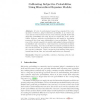Free Online Productivity Tools
i2Speak
i2Symbol
i2OCR
iTex2Img
iWeb2Print
iWeb2Shot
i2Type
iPdf2Split
iPdf2Merge
i2Bopomofo
i2Arabic
i2Style
i2Image
i2PDF
iLatex2Rtf
Sci2ools
122
click to vote
SBP
2010
Springer
2010
Springer
Calibrating Subjective Probabilities Using Hierarchical Bayesian Models
Abstract. A body of psychological research has examined the correspondence between a judge’s subjective probability of an event’s outcome and the event’s actual outcome. The research generally shows that subjective probabilities are noisy and do not match the “true” probabilities. However, subjective probabilities are still useful for forecasting purposes if they bear some relationship to true probabilities. The purpose of the current research is to exploit relationships between subjective probabilities and outcomes to create improved, model-based probabilities for forecasting. Once the model has been trained in situations where the outcome is known, it can then be used in forecasting situations where the outcome is unknown. These concepts are demonstrated using experimental psychology data, and potential applications are discussed.
Applied Computing | Event’s Actual Outcome | Judge’s Subjective Probability | SBP 2010 | Subjective Probabilities |
Related Content
| Added | 28 May 2010 |
| Updated | 28 May 2010 |
| Type | Conference |
| Year | 2010 |
| Where | SBP |
| Authors | Edgar C. Merkle |
Comments (0)

